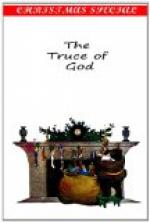Both kings prepared vigorously for the struggle which could not be long postponed. Henry’s measures were admirably calculated to increase his power. He scattered rich benefices lavishly among the clergy, lured on the soldiers of fortune with tempting bribes, and granted enviable privileges to the seaboard towns. The citizens of Augsburg, after tasting his bounty, braved the menaces of his antagonist. Hordes of brigands from Bohemia were attracted to his camp by brilliant largesses and the prospect of an easy booty. The German cities, and particularly those along the Rhine, had always, pursuant to the policy of his ancestors, been the object of his peculiar favor, and the merchants of Worms were relieved from all imposts. The population of these cities was soon ranged under the banner of Henry, whose ranks increased so long as gold could buy, and the promise of license and plunder attracted.
Rodolph’s policy served to diminish instead of swelling his numbers. He devoted himself, at the sacrifice of everything else, to gain the Pope to acknowledge him as king. He appeared the inflexible chastiser of simony and ecclesiastical corruption. The very day of his coronation he had obtained the dismissal of a simoniacal deacon. Everywhere he compelled the nominees of Henry to fly, and filled their places with zealous champions of the canonical discipline. At Constance and Zurich he drove the irregularly appointed bishops from their sees: he placed Lutold, a zealous champion of the Pope, over the monastery of St. Gall, which had been devoted to his rival. Many, frightened by these severities, deserted his standards, and others recoiled from the presence of so rigorous an enforcer of spiritual purity.
Thus, while the cause of Henry was flourishing under his criminal artifices, Rodolph was weakened by his honest severity. Yet there was this difference between the parties. The minions of Henry were goaded on by individual interests—the partisans of Rodolph by a common resolution to die in defence of a sublime principle; the first were incited by the hope of plunder, the lust of empire, ambition, avarice, or a lawless appetite for war—the last were animated by a love of liberty, and fought for future security from oppression; the one prepared to preserve unrighteous license and ill-gotten gains—the other were inspired by the hope of regaining the freedom of which they had been unjustly deprived, and by the resolve to regain their ancestral rights and to protect the outraged Church of God.
Albert of Hers with all his energy and address had not succeeded in extracting from Suabia more than two thousand men. With this small force he joined Rodolph, who was then encamped at the little village of Sommeringen, with scarce three thousand Suabians. Here they learned that Henry, at the head of twelve thousand effective troops, was advancing upon Suabia through Ratisbon. Rodolph soon heard of the atrocities of his rival, who abandoned the country to fire, sword, and rapine. Old men and women, pale with fear, came crowding into camp with thrilling tales of the brutality of the Bohemians and their associates. The war had begun; and Henry was devastating the region bordering on the Danube and the Rhine, from Esslingen to Ulm.




